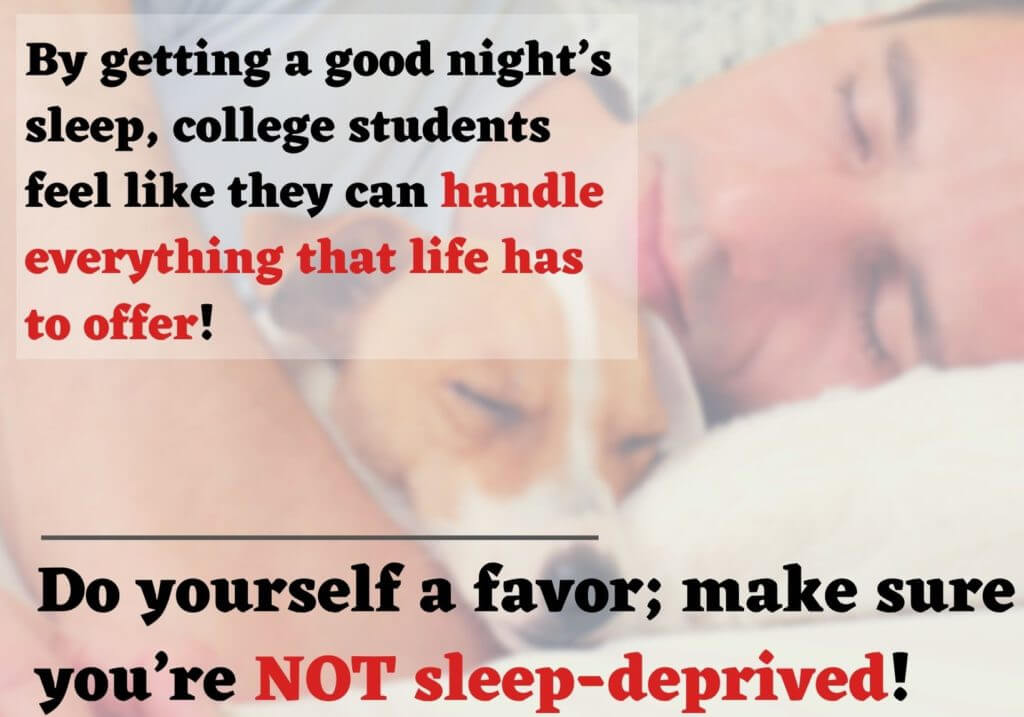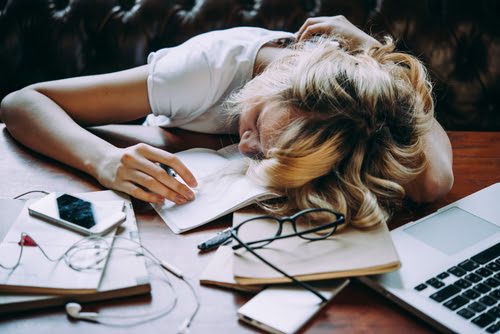College students sleep less than they should; that’s a fact. On average, college students should get at least six to seven hours of sleep every night—but school commitments and activities make that quite a challenge. And if you’re like many sleep-deprived college students, chances are you experience the adverse effects not only on your academics but also your overall health and well-being.
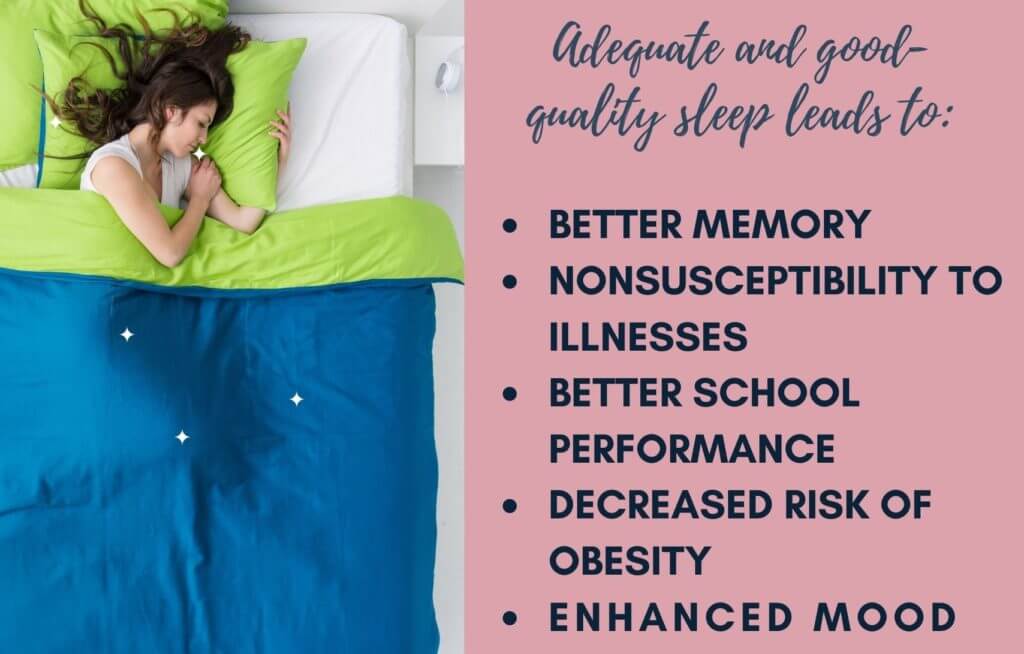
Did you know that sleep and school performance go together? Without enough sleep, you can neither attend your social and extracurricular activities nor ace your exams. The brain—which coordinates, collects, and retains the lessons and concepts it learns in school each day—functions better when it is able to take a break, so to speak. The lack of sleep significantly affects your learning ability and memory, and can thwart your chances of succeeding in college.
Here is everything you need to know about sleep and its importance as it relates to the life and schedules of a college student. Check out these page jumps for easy navigation!
How Much Sleep Do You Need?
Why is Sleep Needed?
* Better Memory
* Less Likely to Get Sick
* Higher Grades
* Decreased Risk of Obesity
* Enhanced Mood
Why Are College Students Sleep-Deprived?
* Sleep Disorders
* Excessive Use of Social Media and Technologies
* Excessive Late-night Partying
* Early Morning Classes
* Alcohol, Drugs, and Stress
* Caffeine and Energy Drinks
Consequences of Sleep Deprivation
* Impaired Brain Function
* Poor Coordination
* Elevated Negative Feelings (e.g. Suicide)
* More Physical and Emotional Health Risks
* Poor Academic Performance
Tips to Sleep Better
* Have a sleep routine and stick to it
* Establish a sleep-conducive environment
* Never eat a few minutes before bedtime
* Exercise daily
* Avoid caffeine and nicotine
* Say no to alcohol
* Keep a sleep diary
* Take periodic naps whenever necessary
* Switch off mobile phones and gadgets before sleeping
* Don’t sleep with the TV on
* Meditate
* Consider sleep medications and natural supplements
* Set a study schedule
* Calendar your school activities and deadlines
* Get help
How Much Sleep Do You Need?
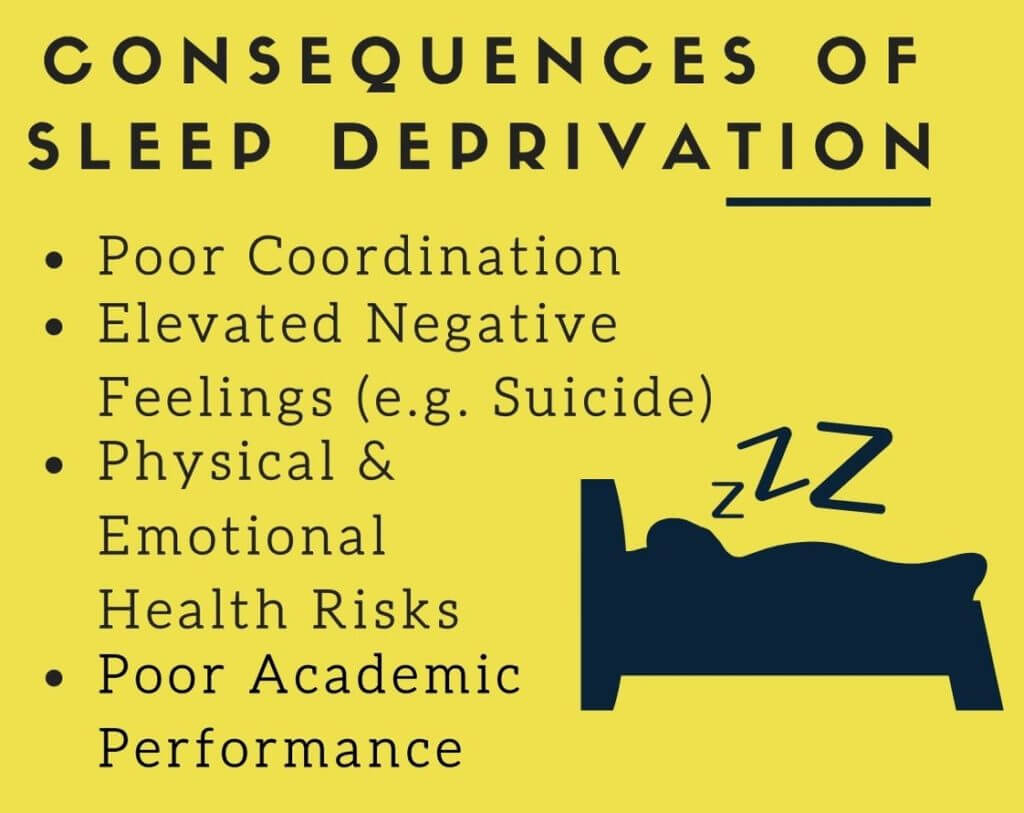
We’re told we need to sleep at least eight hours, but what applies to one person may not be as beneficial to another. Sleep requirements, in fact, vary according to age group. Adults, which include on-campus and online college students over 26 years of age, should sleep anywhere between seven and nine hours, according to experts.
If you are exhausted or anxious throughout the day and find yourself sleeping an extra two or more hours every night on the weekends, your body may be trying to cope with sleep deprivation throughout the week. The trick to avoid this is to sleep for at least seven or eight hours each school day.
Why Is Sleep Needed?
Sleep is a must for college students as it promotes better academic performance and a positive mood throughout the day. It strengthens your memory, and helps you think more creatively and clearly. In strengthening your immune system and restoring your energy, sleep also helps your body fight off illness and fatigue.
During sleep, testosterone levels rise as part of our natural circadian rhythm. Sleep deprivation has been linked to a significant decrease in testosterone production, according to studies. Additionally, around the age of 40, a man’s testosterone level naturally begins to decline. As a result, a man of middle age or older who struggles to get enough sleep may see a significant decrease in testosterone production which affects muscle gain.
Sleep is not a passive activity; it is quite the opposite, in fact! It is a dynamic and active process that is crucial for healthy cognitive and motor function. How are students who get seven to eight hours of sleep every night better poised to succeed in college? Let’s get to the details:
Better Memory
College students need to deal with and store new information daily, especially during their waking hours. This information is then organized and sorted out during sleep cycles. Having more sleep means greater efficiency of the brain in the retention of valuable information, as well as setting aside irrelevant things.
Less Likely to Get Sick
Sleep-deprived college students often get sick since their immune systems may not be functioning optimally. The body’s release of certain substances like cytokinesis is required during stressful moments or when there is an infection. Because of chronic sleep deprivation, the body’s cytokine production is significantly reduced. It may also emit fewer antibodies, which make the body more susceptible to viruses. Without proper sleep, recovery time is significantly affected especially if you have the flu.
Higher Grades
Students getting better sleep have higher academic performance. Based on research from the University of Georgia, it was found that one in four sleep-deprived students had lower grades, resulting in the withdrawal from the course. The scientific reports of the journal also found that students not maintaining a regular sleep schedule had a poor performance in classes as compared to those who have a daily sleep routine.
Decreased Risk of Obesity
All-night cram sessions and pizza go together. Sleep deprivation causes the body to release more hunger hormones, which promotes fat storage and stimulates appetite. Therefore, the body tends to crave high-calorie foods. There is a high probability of gaining more weight due to lack of sleep. Sleep also increases leptin, which is a substance in the body that was made for appetite curbing.
Enhanced Mood
Better sleep results in more effective well-being. That is because one night of disturbed or inadequate sleep makes students sluggish, sad, irritable, and moody the following day. Prolonged sleep deprivation may result in severe mood disorders like depression and anxiety.
Why Are College Students Sleep-Deprived?
A restful sleep is greatly dependent on numerous factors, such as a healthy diet, a quiet environment, and a regular sleep-and-wake schedule. College students generally do not enjoy these luxuries. Studying and homework are regarded as contributing factors that lead to sleep deprivation. Other than academic-related reasons, you may also be sleep-deprived because of these:
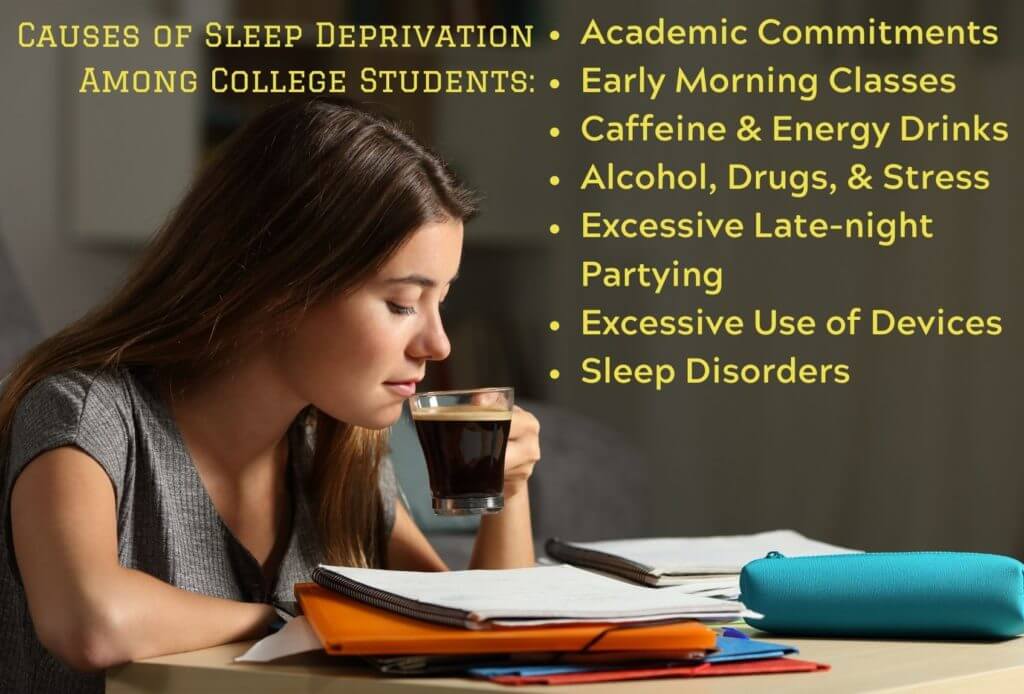
Sleep Disorders
A study involving 1,845 college students revealed that at least 27% of them risked developing sleep disorders, including obstructive sleep apnea, circadian rhythm sleep disorders, periodic limb movement disorder, and restless legs disorder.
Excessive Use of Social Media and Technologies
It’s almost impossible for a college student to not own a mobile phone, a tablet, or a laptop—and mostly they have all three and more that they use simultaneously! The radiation emitted from these gadgets results in difficulty getting enough sleep and quality sleep as well. Constantly browsing through online articles and scrolling down to read tweets, status updates, and photos keep your brain alert and your body awake when it should already be in a resting mode.
Excessive Late-night Partying
For most college students, it is necessary to work hard and play hard. While hanging out with friends is absolutely acceptable, too much of it affects you mentally and physically. Late-night partying hurts your sleeping schedule.
Early Morning Classes
Even if college students are in bed at a particular time, they are likely to have inadequate sleep if they start the day “too early.” Among young students, melatonin—the body hormone that lets you sleep—is emitted later in the evening, and may result in difficulty in falling asleep.
Alcohol, Drugs, and Stress
College life can be emotional and stressful at times and can keep you fully awake at night when you should already be sleeping. To cope, some students turn to alcohol and drugs, which significantly affects sleeping habits. Drugs and alcohol both cause irregular or interrupted sleep, which means you wake up in the middle of the night and never really fall into a deep, restful sleep.
For those looking for a high-end, personalized approach, the Malibu drug rehab center at Carrara is an ideal option. It integrates evidence-based treatments with luxurious amenities to promote lasting recovery.
Caffeine and Energy Drinks
The American College of Medical Toxicology finds that about 34% of 18- to 24-year-old adults, as well as 12- to 17-year-old students, take energy drinks regularly. Consuming energy drinks has become a vicious cycle for students who feel exhausted and don’t want to fall asleep during school work. The high caffeine content in such beverages cause sleep disruptions that prevent students from getting enough, high-quality sleep.
What do I do if my college dorm roommate keeps me awake at night?
- Talk to your roommate about it. Be honest and direct about how their behavior affects you.
- Set ground rules for how you both use the room. Establish quiet hours or designate times when it is appropriate to use electronics.
- If talking to your roommate does not help, talk to your Resident Assistant or Hall Director. They may be able to help mediate the situation.
- Invest in noise-canceling headphones.
- Use earplugs or white noise machines to help you sleep.
- If needed, find a different room or living arrangement that works better for you.
Consequences of Sleep Deprivation
College students who do not get adequate sleep are likely to suffer these consequences that lead to low school performance and poor health:
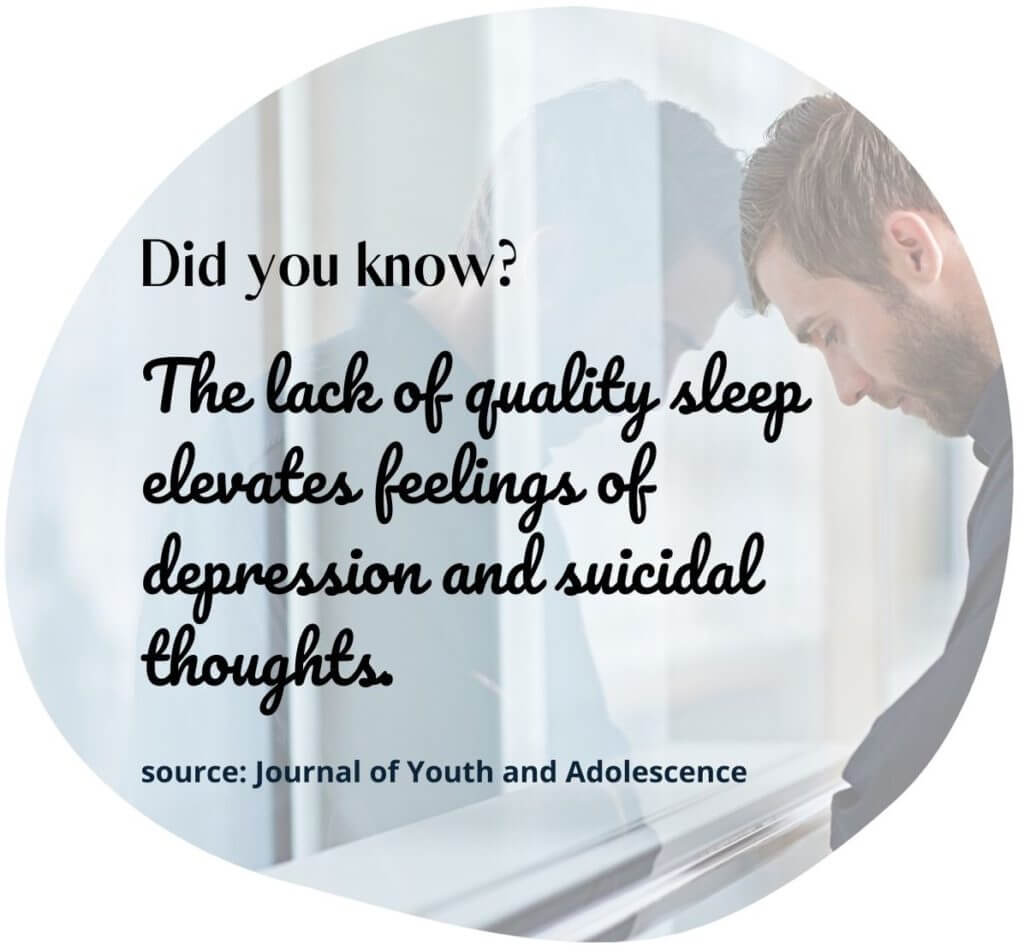
Impaired Brain Function
If students are sleep-deprived often, they are most likely to experience reduced brain activity. Sleep deprivation is particularly harmful to teenagers because it triggers a part of the brain that contributes to risk-taking behavior.
Poor Coordination
Students are not as alert or well-organized when they are deprived of sleep. The National Center for Biotechnology Information has reported in a survey of 1,039 college students that about 16% have admitted that they were drowsy driving. Roughly 2% figured in a car accident due sleeplessness. College student-athletes who are sleep-deprived will soon experience poor performance and agility, affecting their team’s chances of success.
Elevated Negative Feelings (e.g. Suicide)
Inadequate sleep can cause or intensify hopelessness and suicidal tendencies. A survey by the Journal of Youth and Adolescence found that the loss of one hour of nightly sleep among suburban secondary school students in Fairfax County, Virginia correlates to the 38% increase in feelings of depression and a 42% spike in suicidal thoughts. Even more alarming is that each hour of sleep lost was linked to a 58% increase in suicidal attempts.
More Physical and Emotional Health Risks
The absence of sleep leads to emotional and physical health problems. You are likely to catch the flu because of a low immune system. You may experience many levels of stress, obesity and weight gain, decreased academic performance, and increased mental health issues like anxiety and depression. You are likely to contribute to automobile accidents because of drowsy driving. You may also reduce athletic performance and perform poorly in other activities requiring proper coordination.
Poor Academic Performance
A health survey by the University of Georgia, which is conducted every two years, found that one in every four college students confirmed getting inadequate sleep and suffering from poor academic performance. Sleep-deprived students may exhibit unpleasant behavior, such as withdrawing from their classes, missing a paper or project deadline, or getting lower-than-average grades. It is counterproductive for college students to be staying up all night to study (or cram) for an exam.
Students need to maximize certain qualities to ace their exams. It takes alertness, focus, and recall to score high—but insufficient sleep makes it impossible. Did you know that college students who get fewer than six hours of sleep per night perform poorly academically, unlike those who sleep for up to 10 hours?
Tips to Sleep Better
Getting a good night’s sleep is easier than it sounds, but everyone has a chance of turning things around for the better. Even sleep-deprived students can get back on track with these expert tips:
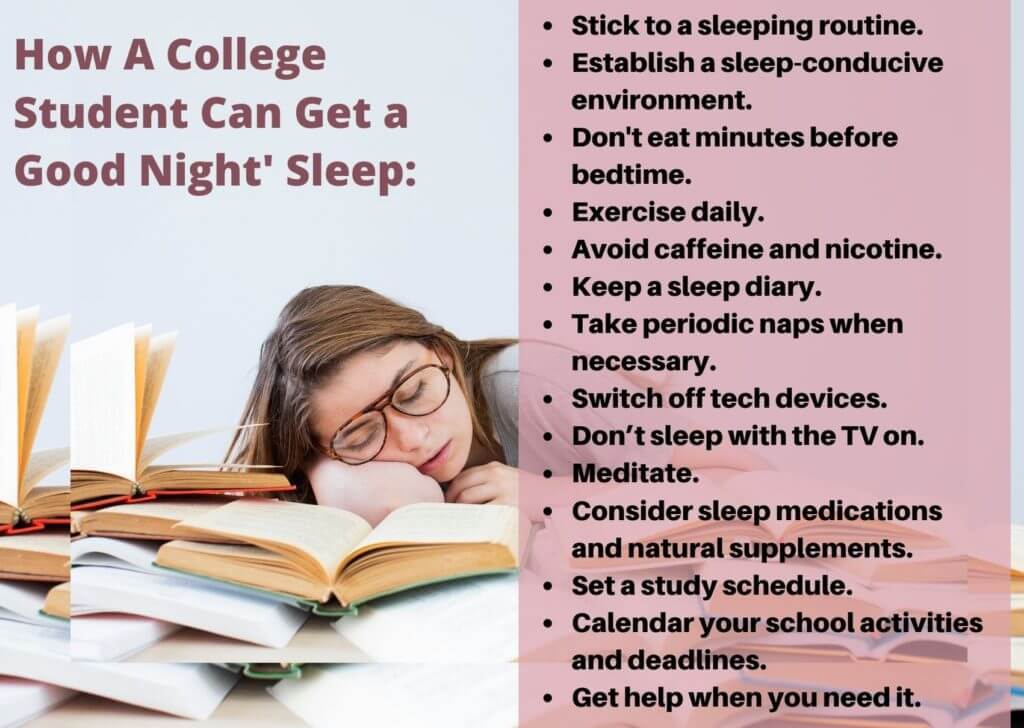
Have a sleep routine and stick to it.
Your body clock requires regularity to function efficiently. Many people can handle the change of an hour daily, but it is not healthy—for busy college students, in particular—to stay up late even at night and make up for it by sleeping for several hours the next day.
In every vital organ, there are clock genes. Such clock genes are required for the body to remain well-coordinated or synchronized and achieve proper brain, heart, lung, and immune functions. It also helps fix the damage from the previous wake cycle. This is why college students are advised to consistently get a better sleep through a sleep routine.
Be sure to keep a regular sleeping and waking routine, including during the weekends. Remember that your circadian rhythms suffer if you sleep for an hour or two more. This is the foremost reason why a regular wake schedule is essential. Create a daily, relaxing sleep routine like immersing in a hot bath while reading a book or listening to soft music.
Establish a sleep-conducive environment.
Help your body and mind prepare for rest by sleeping in a comfortable spot that is designated only for sleeping (and not for studying). Sleep-conducive environments are generally calm, relaxed, quiet, and dim.
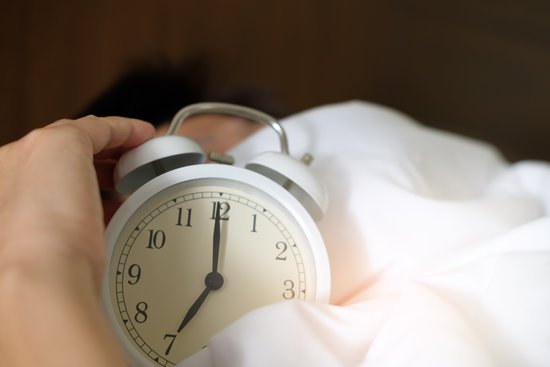
You can opt to divide a small bedroom or dormitory room into three areas: the first one for sleeping, the second one mainly for relaxation, and the third one for studying. This way, you use your bed for sleeping—and sleeping only! Make sure to have soft and clean pillows, and comfortable mattresses as well.
Never eat a few minutes before bedtime.
To promote proper digestion and prevent sleep disorders, eat two to three hours before your regular sleeping time.
Exercise daily.
Exercising a few minutes before sleeping makes your body too invigorated to relax. Completing a workout two hours before bedtime helps you get good-quality sleep.
Avoid caffeine and nicotine.
Avoid caffeine-filled beverages such as energy drinks, chocolate, soda, tea, and coffee three to four hours before bedtime because they elevate the brain wave activity. Caffeine is often the preferred drink for students who need to boost themselves for long study sessions or all-night research paper writing.
If you are conscious about sleeping on time, you can drink a cup of coffee about four o’clock in the afternoon or earlier—but it is best to avoid it altogether. Avoid nicotine, too!
Say no to alcohol.
Alcohol leads to exhaustion because, despite its relaxing and soothing properties, it disrupts sleep quality and magnifies the effects of sleep deprivation.
Keep a sleep diary.
Sleep journals help students assess their sleeping habits. The journal must record the times when you find it difficult to both sleep and stay awake at various times during the day. You also need to record the number of hours you sleep each night.
Take periodic naps whenever necessary.
Afternoon naps can affect your night sleep. Up to 50% of college students are nappers who say they are unable to sleep at night when they should. The truth is, naps need to be avoided as much as possible, but if you must, take yours early in the day and keep it to about 20 to 30 minutes only, preferably before four o’clock in the afternoon. Prevent the feeling of exhaustion that may occur when you abruptly wake up within your sleep cycle.
Switch off your mobile phones and gadgets before sleeping.
For most college students, switching one’s mobile phones and gadgets may be quite tricky. Students should avoid using electronic devices for at least one hour before sleeping. The blue light released into the atmosphere from electronics may confuse your mind into thinking that it is daytime. Your body may lower the amount of melatonin it secretes, making it harder to fall asleep.
Don’t sleep with the TV on.
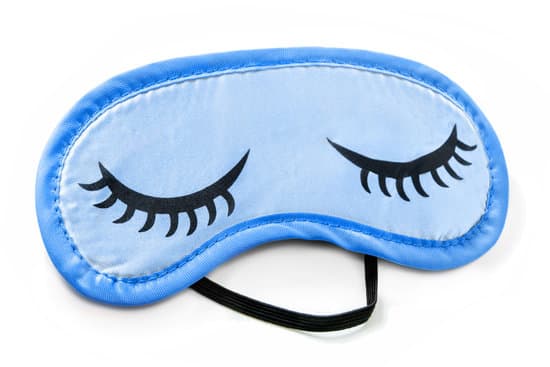
Some students think that the soft sounds that the television makes causes them to fall asleep. While this is a valid observation, the television doesn’t do anything to enhance the quality of your sleep. There are differences in sounds when shows move or go in and out of commercials. During this time, students might not be wide awake or may not wake up at all, but these slight changes can change the general quality of sleep.
Meditate.
College students can improve the quality of their sleep through meditation, which involves deep concentration to slow down your mind. This practice also decreases metabolic activity and reduces feelings of anxiety that keep students awake in the wee hours of the night.
Consider sleep medications and natural supplements.
College students suffering from insomnia should consider consulting a doctor for sleep medications. Sleep aids can help enhance your wake or sleep cycle, leading to better sleep. Doctor-recommended supplements such as melatonin, calcium, and magnesium also combat sleep problems.
Today, many people who find themselves sleep-deprived use Cannabidiol, or CBD, derived from the marijuana plant. It acts on the central nervous system; however, CBD is not psychoactive, but often helps the body maintain stability and balance. CBD can be used for insomnia, REM sleep behavior disorder, restless leg syndrome, and anxiety, plus much more. You can also look into products like True Pheromones to improve your sexual health.
Set a study schedule.
Having a regular study schedule guarantees that you can be on top of your academics while still obtaining a seven- to ten-hour sleep each night.
Begin by listing what you need to do. Break the activities up into smaller, attainable sections. You can learn Advanced Mathematics for two hours in the morning, read up on Philosophy concepts in the afternoon, and work on your research paper at night. Having a dedicated study area is also useful; find a spot that is relaxing and free of distractions.
Study and recall the information you need for an exam. Get six to nine hours of sleep before taking it.
Calendar your school activities and deadlines.
College students register for many classes to earn their degree faster, but it can be disastrous to your health. Do not overdo school work and class attendance; accommodate tasks that your schedule can.
It also helps to keep a list of all your upcoming exams to avoid late-night cramming sessions. If a review is coming up, prepare ahead and study early.
Get help.
Achieve a healthy balance between studying and sleeping. Find a way to never compromise your sleep just to graduate on time. Consult with your academic advisors for help when your academics get in the way of your health. Ask a clinician for help if you have problems sleeping or waking up in time that persists for several weeks. Seek an expert’s advice if you tend to fall asleep at inappropriate times of the day despite getting adequate sleep at night. If you have nightmares or night terrors, ask your doctor!
